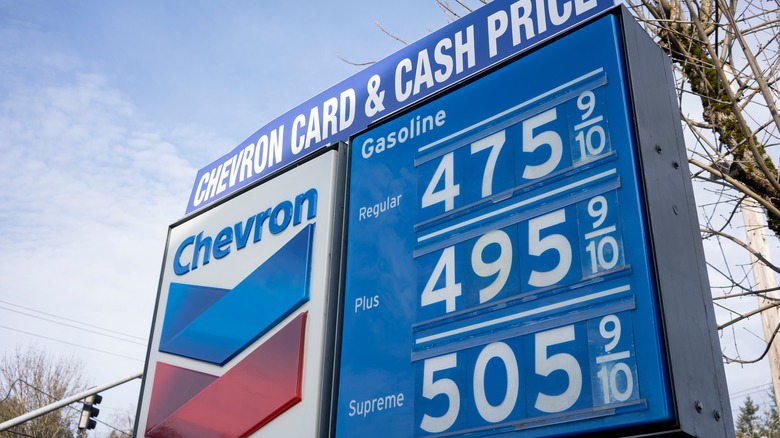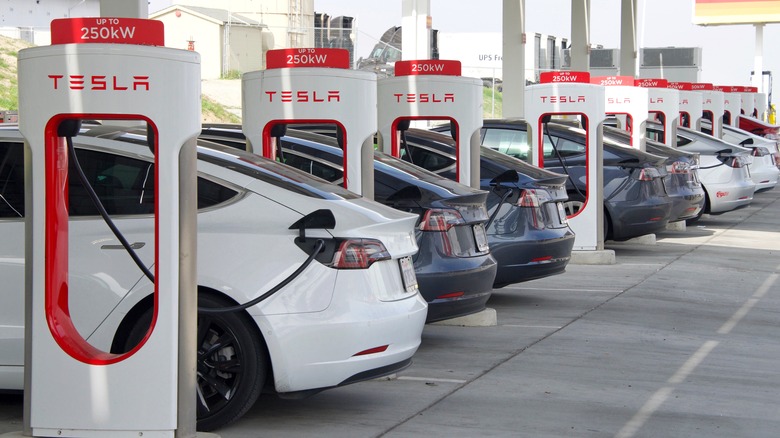Are You Really Saving Gas Money With Your EV?
The electric vehicle revolution aims to reduce fossil fuel dependency, mitigate emissions, and reduce the impact of transportation on climate change. Those are great, but when it comes to an individual consumer, there's another expected benefit that often gets the most attention: saving on fuel costs. Though it costs money to recharge an electric vehicle, of course, the rate is usually lower than that of a tank of gas — though it's a bit more tricky to calculate the overall fuel savings.
The U.S. Department of Energy's Fuel Economy website allows users to compare fuel savings between gas, hybrid, and all-electric vehicles. Based on the site's tool, a 2022 Nissan Leaf SV/SL can save its owner up to $9,250 in fuel costs over the course of five years on average, the same savings a 2022 Hyundai Ioniq 5 all-wheel-drive provides. On the other hand, a 2022 Tesla Model 3 Long Range AWD has higher savings at $10,000 over five years. These numbers seem straightforward, with thousands of dollars to be saved on electric costs every year. However, there are certain factors that need to be considered, including the state in which the vehicle is operated and whether you primarily use home or public charging systems.
Fuel savings depends on charging method
In October 2021, the Anderson Economic Group released a report that compared the costs of gasoline vehicles against EVs and concluded that electric vehicles can be more expensive than fuel vehicles. However, when compiling the report, the Anderson Group used data for EVs mostly charged using commercial charging stations. The group also added hidden costs like time spent on charging. In some cases, using a public charger can cost three times as much as charging at home.
Charging costs and fuel savings will depend on what kind of charger a driver uses. Level 1 chargers can take up to 24 hours to charge an EV; they are the slowest chargers available but also the cheapest. Level 2 — the most popular charger — can provide about 28 miles of range in just one hour, with a price ranging from $1 to $5 per hour, depending on the state. Level 3 fast chargers are the most expensive but can get an EV to 80% charge in one hour with costs of $10 to $30, according to Travel and Leisure.
Tesla Supercharger costs are also tricky to estimate due to things like local electricity rates and the size of the car's battery. Supercharging a Model 3, Model Y, or Model S, according to the charging cost calculator offered by Impact Investor, will likely fall between $10 and $20 for most people. Gas prices, meanwhile, also vary from state to state. Finder reported in April 2022 that filling up a Ram 2500 costs around $109, while a Grand Cherokee or a Toyota 4Runner costs $79, and filling up a Honda Civic, Toyota Corolla, Mazda CX-30, or Honda CR-V can be done for $45 or less.
How driving an EV affects fuel savings
In the U.S., electricity costs vary significantly depending on the city and state, and prices have been increasing due to a variety of factors, including inflation and an economic slowdown during the post-pandemic recovery. CNBC reported in March 2022 that electricity costs in some U.S. cities have been rising at around the same rate as gasoline; however, the savings EVs offer when it comes to fuel costs remains significant. The report adds that while gas prices may fall in the coming months, the price of operating an EV still probably won't end up costing more than a traditional car.
Choose Energy lists Hawaii, Connecticut, Rhode Island, Massachusetts, and California as the top five states with the highest energy prices. Data from the U.S. Energy Information Administration shows that California saw an increase in electricity bills of 13.6% from February 2021 to February 2022. Illinois saw an increase of 14.5%, while New Hampshire sat at 14.9% and Connecticut at 16.7% during that same period. Almost all states have seen increases in energy bills over the last year or so, though not all of them at such drastic levels.
With that said, while energy prices in the U.S. are rising across the board, so are gas prices. Though it's likely owning an EV will save you considerably in fuel costs compared to owning a gasoline vehicle in the U.S., the exact savings you see will be based, in part, on which region of the country you live, its current electricity rates, and the rates it'll face in coming months and years.


